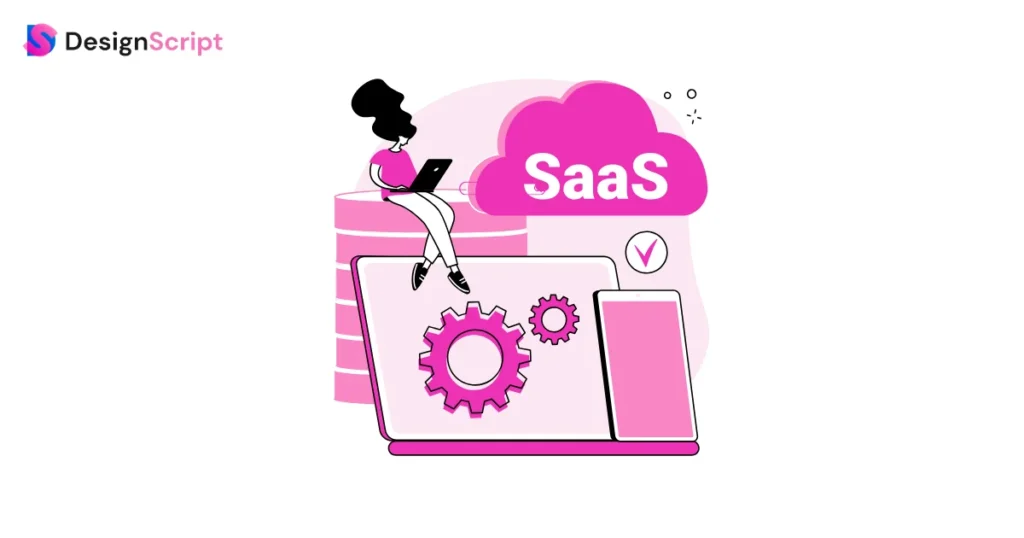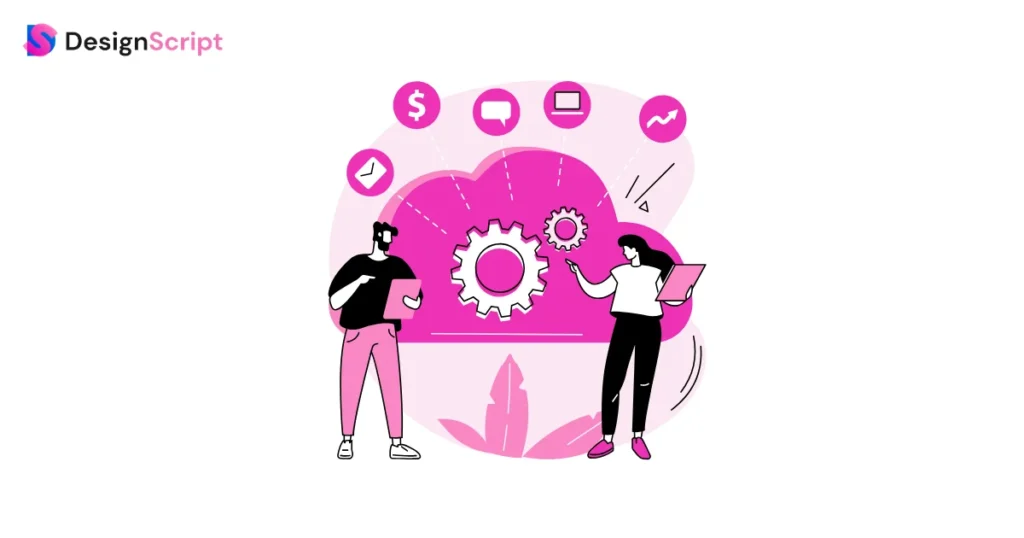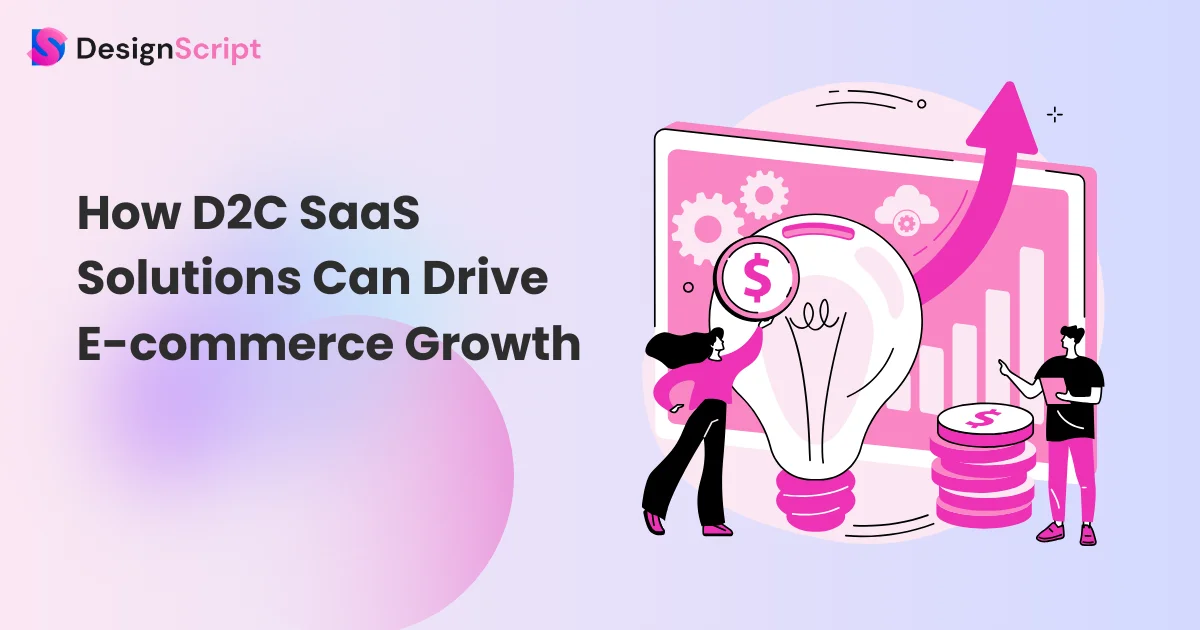How D2C SaaS Solutions Can Drive E-commerce Growth
In today’s fast-paced e-commerce landscape, D2C brands are reshaping how consumers shop, but that doesn’t come without its hurdles. You’re not just competing for attention; you’re also juggling inventory, marketing, and customer relationships, all while trying to provide a top-notch shopping experience. It can feel overwhelming.
That’s where D2C SaaS (Software as a Service) solutions step in. Think of them as your trusty toolkit for automation and efficiency. These tools help you streamline processes, so you can focus more on what really matters: connecting with your customers and growing your brand.
In this article, we’ll explore some of the best D2C solutions out there and how they can transform your e-commerce business.
We’ll dive into the benefits, practical tools, and real-life success stories that show just how powerful these SaaS solutions can be.
Let’s jump in and see how you can supercharge your e-commerce strategy!
Table of Contents
What Are SaaS Solutions for D2C Brands?

At its core, SaaS (Software as a Service) is a way to deliver software over the internet, allowing users to access applications through a web browser without the hassle of installations or updates. For D2C brands, this means you can tap into powerful tools without needing a full IT team to manage them.
Why? Because running a D2C business involves juggling a lot—everything from your online store to marketing and customer support. You need tools that help you do all this smoothly, and that’s where D2C SaaS solutions come in. They’re designed to be flexible and scalable, making it easy to adapt as your business grows.
Let’s look at a few popular SaaS platforms that many D2C brands swear by:
- Shopify: This platform is like the Swiss Army knife for online stores. It’s user-friendly and packed with features, so you can set up your shop and start selling in no time. Plus, there are tons of customizable templates to help you create an eye-catching storefront.
- Klaviyo: If you’re looking to amp up your email marketing, Klaviyo is the way to go. It helps you automate campaigns and really get to know your customers, so you can send them tailored messages that resonate.
- HubSpot: Think of HubSpot as your all-in-one marketing partner. From managing customer relationships to streamlining your content and sales processes, it’s a robust tool that many D2C ecommerce agencies rely on.
By using these D2C SaaS solutions, you can save time, reduce stress, and focus more on building strong connections with your customers.
Key SaaS Tools for E-commerce Growth

When it comes to driving growth in your D2C business, the right SaaS tools can make all the difference. Here’s a look at some essential platforms that can help you manage customer relationships, streamline marketing efforts, and gain valuable insights.
CRM Tools
Customer relationship management (CRM) is crucial for any D2C brand looking to build lasting connections. HubSpot is a standout in this arena. With its intuitive interface, HubSpot allows you to track interactions with customers, manage leads, and automate follow-ups. This means you can spend less time juggling spreadsheets and more time nurturing relationships that drive sales. It’s a must-have for any D2C ecommerce agency aiming to enhance customer engagement.
Email Marketing & Automation
Email marketing is still one of the most effective ways to connect with your audience, and Klaviyo takes it to the next level. This platform not only helps you craft beautiful emails but also automates your campaigns based on customer behavior. Want to send a personalized follow-up after a purchase? Or maybe a reminder for items left in a cart? Klaviyo makes it easy to turn potential customers into loyal fans with targeted messaging that resonates.
Analytics & Reporting
Understanding how your business is performing is vital for growth. Tools like Google Analytics and Hotjar provide invaluable insights into customer behavior and website performance. With Google Analytics, you can track key metrics like traffic, conversions, and user demographics. Hotjar, on the other hand, gives you a peek into how visitors interact with your site through heatmaps and session recordings. Together, these tools help you make data-driven decisions to optimize your e-commerce strategy.
Shopify
Shopify has earned its reputation as a go-to e-commerce platform for a reason. It’s user-friendly and packed with features that allow you to easily manage your online store. Whether you’re just starting out or scaling up, Shopify provides everything you need—from customizable templates to secure payment options. It’s the backbone for many D2C brands looking to create a seamless shopping experience.
Klaviyo
As mentioned, Klaviyo isn’t just about sending emails; it’s about building relationships. With its advanced segmentation and automation features, you can tailor your messaging to fit each customer’s journey. This means higher engagement rates and, ultimately, more conversions. For D2C brands, this is one of the best D2C solutions to ensure your marketing efforts are effective and impactful.
HubSpot
HubSpot stands out not just for CRM but as a complete marketing ecosystem. It integrates seamlessly with other tools, making it easy to manage campaigns, track leads, and analyze performance all in one place. This holistic approach is perfect for D2C brands looking to streamline operations and maximize growth potential.
By leveraging these key SaaS tools, you can enhance your e-commerce growth and create a more engaging experience for your customers. With the right technology at your fingertips, you’ll be well on your way to scaling your D2C brand successfully.
How SaaS Solutions Enable Scalability

Scaling a D2C brand can feel like a monumental task, especially when you’re trying to keep up with customer demands and manage numerous processes. That’s where D2C SaaS solutions come into play, making the journey to growth not just possible but also smoother and more efficient.
Automating workflows to reduce manual tasks.
One of the biggest challenges for any growing business is the sheer volume of repetitive tasks that can drain your time and energy. This is where automation shines. SaaS solutions can help automate workflows, think email follow-ups, order confirmations, and customer notifications, freeing you up to focus on strategic growth initiatives. By reducing manual tasks, you not only save time but also minimize the risk of errors, ensuring a seamless experience for your customers. Imagine having more hours in your day to brainstorm new marketing strategies or engage directly with your audience.
The role of SaaS in managing inventory, customer service, and marketing campaigns.
Effective inventory management is critical for D2C brands, especially when demand spikes. SaaS tools can help you keep track of stock levels in real time, making it easier to manage supply chains and prevent stock outs or overstock situations. This visibility allows you to make informed decisions and respond quickly to customer needs, which is essential for maintaining a competitive edge.
When it comes to customer service, SaaS solutions can centralize your communication channels, allowing you to manage inquiries from various platforms in one place. This not only improves response times but also enhances customer satisfaction, as your team can access all the information they need at their fingertips.
Marketing campaigns are another area where SaaS tools excel. With platforms like Klaviyo and HubSpot, you can easily segment your audience, personalize your messaging, and track campaign performance, all from one dashboard. This level of automation and analytics enables you to run targeted campaigns that drive engagement and conversions, making your marketing efforts more effective.
Leveraging SaaS solutions enables D2C brands to scale efficiently by automating workflows and streamlining processes across inventory management, customer service, and marketing. By embracing these best D2C solutions, you’ll not only enhance operational efficiency but also create a solid foundation for sustainable growth.
Integration of SaaS Solutions with E-commerce Platforms

- Select the Right Tools: Start by choosing SaaS solutions that complement your e-commerce platform. For instance, if you’re on Shopify, look for tools specifically designed for it. Think about what you need, like email marketing or customer support and pick accordingly.
- Leverage APIs: Most e-commerce platforms offer APIs that allow different tools to communicate. Familiarizing yourself with these can help ensure your systems work together smoothly. For example, integrating your inventory management with your store means customers see real-time stock levels, reducing overselling headaches.
- Consider Middleware: If you’re juggling several tools, middleware can help connect them without a lot of technical hassle. It acts like a translator between systems, making sure they all talk to each other effectively.
- Automate, Automate, Automate: Think about tasks you do repeatedly, like sending follow-up emails. Automating these processes can save you time and boost conversions. Tools like Zapier are fantastic for connecting different applications and streamlining workflows.
- Test, Test, Test: Before going live, make sure everything is working as it should. Test the integrations to catch any glitches. This step is crucial to ensure a smooth customer experience.
- Monitor and Improve: Once you’re up and running, keep an eye on how things are performing. Use analytics to see what’s working and what isn’t. Regular updates to your tools and platforms will help you stay ahead of the curve.
Best practices for combining multiple SaaS tools into a cohesive system.
- Keep It Simple: While it’s tempting to use a ton of tools, too many can create chaos. Focus on what truly adds value to your business and enhances the customer journey.
- Centralize Your Data: Having a single dashboard where you can manage all your SaaS tools makes life easier. It helps you track everything without jumping between platforms.
- Invest in Training: Make sure your team knows how to use the integrated systems. Regular training sessions can keep everyone up-to-date on the latest features and best practices.
- Prioritize the Customer Experience: At the end of the day, your customers should be at the heart of your integrations. Choose tools that enhance their experience and make shopping with you a pleasure.
- Get Expert Help: If the thought of integration feels daunting, consider teaming up with a D2C ecommerce agency. Their expertise can simplify the process and help you avoid common pitfalls.
Pros and Cons of Using SaaS for D2C Brands
| Pros | Cons |
| Cost-effective | Subscription costs can accumulate |
| Scalable with growth | Limited customization |
| Easy integration with e-commerce | Dependence on internet connection |
| Access to advanced features | Potential data privacy concerns |
| Reduced IT infrastructure needs | Migration from one SaaS to another can be complex |
Case Study

When it comes to scaling a Direct-to-Consumer (D2C) brand, finding the right strategies and tools is essential. This is where DesignScript, a leading D2C e-commerce agency, stepped in to transform a struggling brand into a thriving success story. By harnessing SaaS automation and smart growth strategies, we helped the brand triple its revenue. Here’s how we did it.
The Challenge
Our client, a promising D2C brand, was facing challenges typical of many small businesses: manual processes that slowed down operations, difficulty in tracking customer data, and limited marketing reach. They needed a solution that would streamline their operations while also driving growth.
The Approach
- SaaS Automation: We began by integrating powerful SaaS tools that automated key business functions. From inventory management to customer relationship management (CRM), these tools helped eliminate manual tasks and reduce human error. The brand could now focus on what truly mattered, serving their customers.
- Data-Driven Insights: With the new systems in place, we implemented analytics tools that provided real-time insights into customer behavior and sales trends. This data allowed the brand to make informed decisions about marketing campaigns and product offerings.
- Personalized Marketing: Leveraging customer data, we developed targeted marketing strategies that resonated with the brand’s audience. By using automated email campaigns and personalized product recommendations, we significantly improved customer engagement and conversion rates.
- Optimized E-commerce Platform: We optimized their existing e-commerce platform for better user experience, ensuring that it was not only visually appealing but also functional. This included streamlining the checkout process and enhancing mobile responsiveness, which is crucial for today’s consumers.
- Continuous Monitoring and Adaptation: Scaling isn’t a one-time effort. We established a framework for ongoing monitoring of performance metrics, allowing us to quickly adapt strategies as needed. This agility helped the brand stay ahead of market trends and customer preferences.
The Results
The impact of our approach was substantial. Within just a year, the brand saw its revenue triple, thanks to the combination of effective SaaS automation and targeted growth strategies. Key metrics included:
- Increased Conversion Rates: Personalized marketing led to a significant boost in sales.
- Improved Customer Retention: Enhanced customer experiences fostered loyalty, with repeat purchases on the rise.
Streamlined Operations: Automation reduced manual tasks, allowing the team to focus on strategic initiatives.
Conclusion
As we’ve seen, harnessing D2C SaaS solutions can be a game changer for brands looking to grow in today’s fast-paced e-commerce world. These tools don’t just simplify your processes; they empower you to connect more deeply with your customers and drive real growth. The success story we shared shows just how powerful the right strategies and automation can be, turning challenges into opportunities.
By adopting these solutions, you free up valuable time to focus on what truly matters, nurturing relationships, enhancing your brand, and delivering exceptional experiences to your customers. It’s about creating a seamless journey that keeps them coming back for more.
If you’re excited about the possibilities and want to take your D2C brand to the next level, let DesignScript help!
As a dedicated D2C e-commerce agency, we specialize in implementing cutting-edge solutions tailored just for you. Together, we can transform your approach and unlock your brand’s full potential.
Let’s connect and start this journey toward growth today!
FAQs
SaaS is software delivered as a service over the internet, accessible from anywhere. Unlike traditional software, it doesn’t require installation on your device.
Yes, you can use multiple SaaS tools to manage different aspects of your D2C business, such as marketing, sales, and customer service.
SaaS tools eliminate the need for on-premise IT infrastructure, reducing hardware, software, and maintenance costs.
Consider factors like scalability, integration capabilities, pricing models, customer support, and security when selecting a SaaS platform.
SaaS providers typically implement robust security measures, but it’s important to verify their security certifications and practices.

